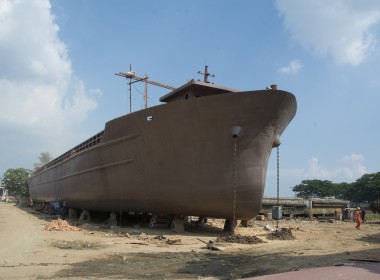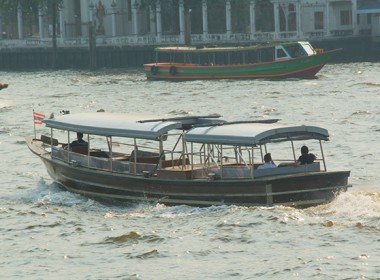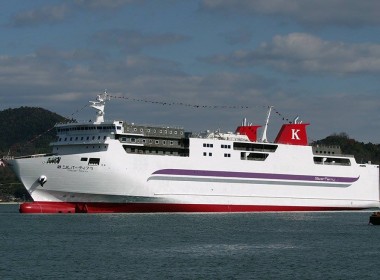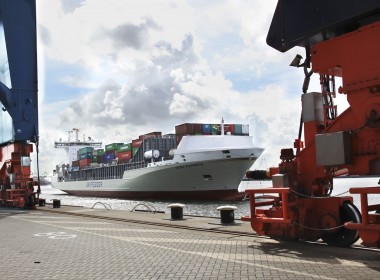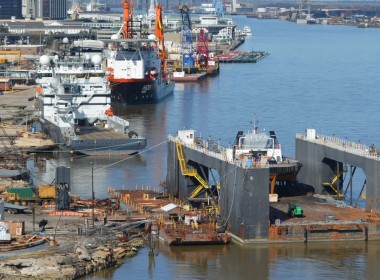FEATURE | Tilawa – The strange tale of 2,364 pieces of silver

In 2012 a Brit racing driver, Ross Hyett, set up Argentum Exploration with the purpose of locating and recovering bullion from wartime wrecks. In July 2012 Argentum contracted Advanced Maritime Services (AMS) to locate the wreck of Tilawa.
Tilawa, named after the Burmese port, was a British India Steam Navigation (later part of P&O) 10,006-ton passenger/cargo liner. She was built by Hawthorn, Leslie at Hebburn, on Tyneside in 1924 and had a 12-knot service speed. She could accommodate 3,957 deck, 62 first-class, and 74 second-class passengers with a crew of 220. At the time of her loss she was probably on the company’s route of Bombay, Seychelles, East Africa, South Africa with mainly Indian labourers on board.
In November 1942 she had left Bombay with 6,472 tons of cargo and 732 passengers. She was northwest of the Maldives when in the early hours of November 23, 1942, she was torpedoed by I-29/Matsu, a Japanese B-1 submarine. The first torpedo disabled but did not sink her. The second hit the portside, and she sank.
The 673 survivors, picked up by the Royal Navy cruiser HMS Birmingham, were brought back to Bombay on November 27, 1942.
In the 6,472 tons of cargo was a consignment of silver. A total of 2,391 bars of silver were shipped FOB Bombay to Durban. The Union of South Africa, now the Republic of South Africa (RSA), paid the Government of India for the silver. This was uninsured whereas Tilawa was covered by the UK’s War Risk Scheme.
The silver was to have been made into coinage for both the Union and Egypt (as silver piastres). Minting was then performed by the Mint in Pretoria, which had only recently become independent of the UK’s Royal Mint. The interest of Argentum was recovery of silver bars that had lain undisturbed for 75 years on the Indian Ocean seabed.
A complex recovery and shipment
It took some two years of research by AMS to pinpoint the wreck site. They were then contracted to arrange the recovery of cargo.
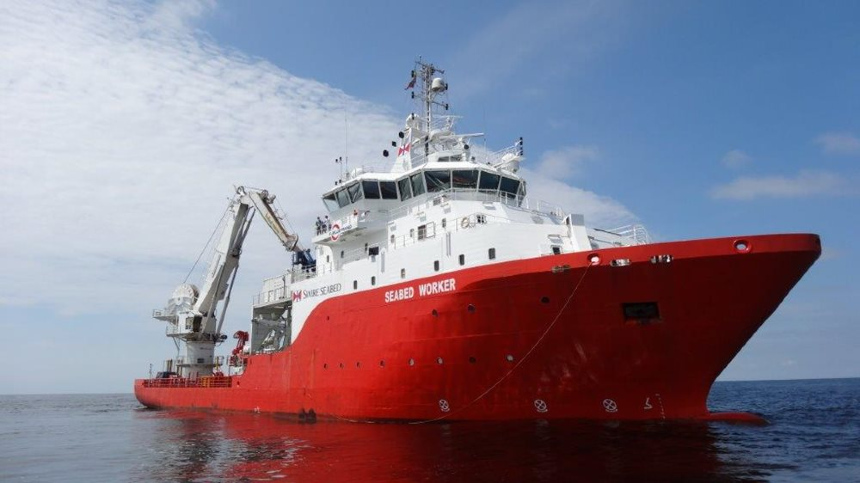
AMS chartered Seabed Worker, a multipurpose subsea vessel belonging to Swire Seabed. It took six months in 2017 to retrieve 2,364 bars from a depth of about 3,500 metres and with a value at that time of US$43 million. The “flyer” for investors in 2012 stated that the cargo was insured by the British Government (it was not).
Salvors believed therefore that the UK Government were the owners. This determined what route Seabed Worker and the other Swire vessel Pacific Askari would take. The bars went via the Seychelles, Cape of Good Hope, and delivery to Southampton on October 2, 2017. The Suez Canal (Egypt) and RSA were avoided. The bars were wet stored in the Seychelles and in the South Africa Contiguous Zone where transhipment to Pacific Askari occurred. Wet storage involved lowering a cage with the bars to the seabed but outside territorial waters, avoiding any risk of arrest to ship and cargo.
Consistent with the belief that the silver belonged to the UK Government, it was declared to the UK’s Receiver of Wreck and placed in a bonded warehouse. Argentum claimed salvage.
RSA had become aware of Tilawa in September 2016 because negotiations were opened with Odyssey Marine Exploration of Tampa, Florida, for the recovery of the Tilawa silver. Odyssey had had a major success for the British Government in 2013 when they recovered 61 tonnes of silver ingots (valued at US$210 million) from the wreck of Gairsoppa.
Gairsoppa was on a voyage in 1941 from India to the UK with silver ingots for the UK’s Royal Mint. A U-Boat torpedoed her on February 17 some 480 kilometres southwest of Galway, Ireland. She was lying at a depth of 4,700 metres so the recovery from this British India Steam Navigation wreck was challenging.
The split of any proceeds from the value of the silver was allegedly 80/20 in favour of Odyssey. The Tilawa “no cure, no pay” contract proposed by Odyssey was in fact signed and meant paying RSA 15 per cent of the net salved value of the silver. It is thought Odyssey was already aware that the silver had been recovered.
Matter taken to court
Under English law, owners of cargo have a year to stake their claim with the Receiver of Wreck. RSA made representations that they owned the silver. In order to make good their claim for salvage, absent any agreement from RSA, Argentum needed a decision from the English Court. Proceedings were therefore commenced on October 1, 2019, seeking a declaration that Argentum was either owner or, alternatively, entitled to salvage on 2,364 silver bars.
On March 3, 2020, RSA asserted its interest in 2,364 silver bars but argued that, as a sovereign state, they were immune from these proceedings by virtue of the UK’s State Immunity Act 1978 (SIA 1978). On April 17, 2020, the UK’s Receiver of Wreck advised both Argentum and RSA that it could make no determination of salvage, and absent any agreement the UK court would decide the level of award. However, the question of sovereign immunity needed to be dealt with by the English Court as a preliminary issue.
Over three days at the end of November 2020, Sir Nigel Teare heard the arguments of Argentum and RSA. Sir Nigel came out of his recent retirement as the UK Admiralty Judge to hear the case, sitting again as a Judge of the English High Court. He gave judgment on December 16, 2020.

The UK State Immunity Act 1978 had to be applied. Section 10(4)(a) provides that no immunity is available if, “both the cargo and the ship carrying it were, at the time when the cause of action arose, in use or intended for use for commercial purposes.”
The hearing had to determine whether RSA could claim immunity from the jurisdiction of the English High Court. Obviously, if it could not, then the silver would be subject to an award of salvage. RSA has indicated that, in any event, Argentum is not entitled to any salvage because that was the preserve of Seabed Worker. The judgment traces the history of sovereign immunity in English law.
An ongoing tug-of-war
Most cases deal with claims against a vessel. It is relatively straightforward to determine if a ship is being used or intended to be used commercially. Cargoes are more problematic since often a bulk cargo is only put to use after the sea carriage has been completed. RSA took the line that on October 2, 2017, neither Tilawa nor the silver was in use or intended to be used. RSA should therefore be immune.
Argentum argued that the 1942 status of the ship and cargo had to be considered and then applied to the situation in 2017. The silver was purchased FOB from India, shipped under a bill of lading, and was subject to a contract for the supply of services. RSA was therefore not entitled to immunity.
The decision in Altair 2008 is the only one involving cargo under SIA 1978. That concerned a cargo of wheat purchased from a Turkish seller by the Grain Board of Iraq for distribution by Iraq’s Public Distribution System. The Grain Board of Iraq denied liability for salvage under the SIA.
Mr Justice Gross suggested that a state cannot claim immunity if the cargo is a commercial one. He further stated that it was not unfair to impose a liability where the state has benefited from that salvage. Sir Nigel clearly did not like the idea that RSA claimed immunity when the salvage clearly benefits RSA. Sir Nigel agreed with Gross J. in Altair, whereas RSA maintained Gross J was wrong.
Sir Nigel gave judgement for Argentum on December 16, 2020. He found that at the time of the cause of action, Tilawa and the silver bars were in use for commercial purposes. This is not the end of the matter. RSA applied for permission to appeal his judgment.
“There are arguments either way,” Sir Nigel pronounced on January 22, 2021, after hearing the RSA application. “Seeking to be intellectually honest, I give permission to appeal.”
It is therefore expected that RSA will now take its case to the UK Court of Appeal. The investors with Argentum will have to wait a little longer to know if they are to be paid.
As a footnote, Argentum was represented by Stephen Hofmeyr QC. The Minister of Finance for the Union of South Africa in 1942 was the QC’s great uncle, Jan Hendrik Hofmeyr, usually known as “Hoffie”.


